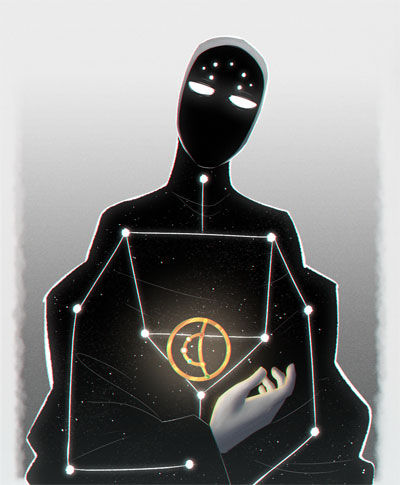Celestian
The Far Wanderer, the Star Wanderer
Celestian is the god of Stars, Space, and Wanderers.
Celestian often appears as a tall, lean man of middle years, wearing black garments set with his symbol, often worked in jewels (diamond, amethyst, sapphire, emerald, topaz, jacinth and ruby) that shine like distant suns. His smooth skin and his eyes are ebony. His voice is a cold and unearthly whisper, which carries well despite its softness, but he seldom speaks. He has power over meteors, comets, asteroids, and similar bodies, and some influence over light and weather. He can summon astral devas to serve him.
Celestian shrines are located in the country, away from city lights, and are often built upon mountain peaks or hilltops with a clear view of the sky.
There are Celestian hospices throughout the depths of space, tended to by priests who have decided to stay in one place for a time. They give shelter, food, air, and advice, appreciating donations, though there is no set schedule of fees. They may give directions and help travellers find work
Divine Domains
Destiny, Knowledge, Night, Oracle, Protection, Travel.
Holy Books & Codes
Travels of the Far Wanderer is a 45-page book of aphorisms and devotionals to Celestian. An intricate star design has been worked into its leather cover.
Divine Symbols & Sigils
Celestian's symbol is a black circle set with seven stars. His colour is black.
Tenets of Faith
Celestian encourages his followers to wander far from home, just as the stars do. Astrology is as much a part of Celestian's faith as astronomy is, and his worshippers are encouraged to discover the secrets within the patterns of the stars and other celestial bodies. Celestians are required to aid travellers in need, but are permitted to charge for their services.
Though Celestians must pledge to wander, they may remain in one place for decades without receiving more than a gentle chiding from Celestian priests. Priests are expected to take their oaths much more seriously.
Celestian has but a small following in the world, being revered by astronomers, astrologers, navigators, philosophers, dreamers, and others who are interested in the sky and the cosmos. Demi-humans and some other humanoids with their own racial deities sometimes worship Celestian alongside their own gods. Members of nocturnal races who have been banished from their kin, perhaps for crimes such as mercy or love for humans, often take to the worship of the Far Wanderer because though the sunlight hurts their eyes, the gentle light of the stars offer acceptance.
While Celestian's following around The Azure Sea is small, on other planes of existence and in the depths of space he is much more popular. He is the deity of choice for planewalkers and many spelljammers.
Celestian's priesthood is divided into seven ranks of ascending power and knowledge, each differing from the last in its number and the placement of the gems in its holy symbol. They search the world, the sky, and other planes for magical meteorites, artefacts, and lore relating to Celestian's spheres of influence. They are adept at divinations. They are very studious and meditative, secretive, and detached from day-to-day existence. They will not use their expertise with stars and space to pilot warships or slave ships, and they will not aid unjust conquerors. Their favoured weapon is the short spear.
- The First Order wears light blue robes. Their symbol is the ruby.
- The Second Order wears robes of light gray. Their symbol is the jacinth.
- The Third Order wears robes of violet. Their symbol is the topaz.
- The Fourth Order wears blue-gray robes. Their gem is the emerald.
- The Fifth Order wears dark blue robes. Their gem is the sapphire.
- The Sixth Order wears robes of the deepest purple hue. They use the amethyst as their symbol.
- The Seventh Order is the most potent. They wear robes of black, and their gem is the diamond.
Holidays
Dark Night, also called Black Night, Star Night, and the Night of Hopeful Dawn, is observed on Goodmonth 11. It is a holy night for the church of Celestian because the stars are so easy to observe without the light of one of the moons getting in the way.
Great Moons Glory on Readying 11th, when Luna is full but Celene is new, is holy to Celestian.
Midwinter Night, also known as Dark Time, Dim Time, and Handmaiden's Glory. It is this night when Luna is completely dark and only Celene is visible in the sky. It is the longest night of the year, during which clerics of Celestian conduct all-night services of moon-watching and stargazing.

Divine Classification
God
Religions
Alignment
Neutral
Children
Gender
Male
Related Myths




Comments